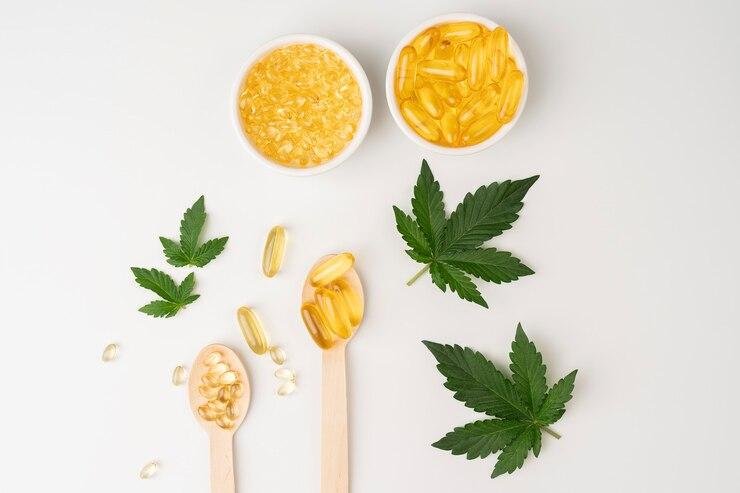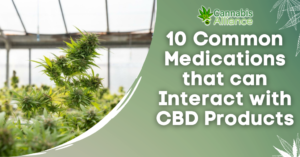In general, the risk of serious interactions with cannabidiol is limited. It is mainly related to the metabolic process of the drugs by the hepatic enzymes. Specifically, the enzymes of a system called cytochrome P450.
Whether it’s CBD or your medication, it’s also the story of dosage, and it plays a major and important role in interactions that can have side effects and vice versa.
According to a recent study CBD could disrupt the action of conventional drugs. The most dangerous possible interactions with Cannabidiol are: warfarin-based anticoagulants, antihistamines such as Doxylamine, thyroid hormones such as Levothyroxine and Clonazepam/Clobazam-based anticonvulsants.
Anticoagulants
Anticoagulants, as the name implies, thin the blood and reduce the risk of blood clots forming, thus reducing the risk of cardiovascular events.
Some common blood thinners are “warfarin or coumafen”, but one study noted that CBD is a booster for warfarin. This study shows that CBD tends to increase the effects and duration of effects of warfarin.
Therefore, it is theoretically dangerous to consume CBD while taking warfarin-based blood thinners. If you are taking a warfarin-based blood thinner and are considering taking CBD, be careful. If you have any doubts, it’s a good idea to talk to your doctor first.
Antihistamines
Antihistamines are used to treat allergies or flu-like symptoms. The doxylamine that is found for the commercialized poultice is to be protected singularly or prepared for CBD.
Secondary effects are avoided: drowsiness, confusion, cognitive and motor agitation, and even adequate respiratory agitation when doxylamine and CBD are mixed.
Again, for this interaction it is found that CBD disrupts the action of enzymes for the liver responsible for doxylamine, and this leads to preferably heavy undesirable addictions.
Be careful if you are taking medication despite allergies or despite a fellow flu sufferer. Check the confusion of your treatment and space it out from your CBD intake as much as possible.

Thyroid hormones
The family of thyroid hormones, including levothyroxine or L-thyroxine, are indicated not only for hypothyroidism, but also for many other forms of hypothyroidism.
The use of CBD in combination with the drug Levotilox often results in unfortunate reactions with serious side effects. Sometimes intakes must be spaced several hours apart.
If you are taking levothyroxine on a daily basis, it is advisable to be extremely cautious before trying cannabidiol. Also be careful to favor galenic forms (e-liquids, CBD patches) that place less strain on the liver.
Anticonvulsants
A family of anticonvulsant drugs specifically indicated for seizure disorders are:
- Clobazam marketed under the name Onfi;
- Clonazepam, marketed under the name Rivotril;
- Lamotrigine, marketed under the name Lamictal: widely used.
In some people, very high doses (about 300 mg per day) of CBD in combination with Clobazam/clonazepam appear to have adverse interactions. These interactions cause extreme fatigue and sedation.
The team of researchers who worked on Epidiolex reminds us that combining anti-epileptics with CBD is basically safe. In another study, scientists explained that it was possible to reduce the dose of clobazam/clonazepam when combined with high doses of cannabidiol. This requires medical supervision.
Antidepressants, anxiolytics and sleeping pills
These drugs are widely prescribed and are used mainly to fight against anxiety, depression, sleep disorders, or other psychiatric disorders. They are not without dangerous side effects, and the risk of addiction to this type of medication should be monitored.
As a precautionary measure, it is recommended that CBD ingestions be spaced 2-3 hours apart to avoid breakdowns and metabolic disruptions with these types of drugs. If you’re on medication, you may want to discuss this with your doctor beforehand.
As for sleep, the big picture is that the risk of dangerous interactions between CBD and antidepressants, anti-anxiety drugs or sleeping pills is low and with minimal precautions.
Corticosteroids: or steroidal anti-inflammatory drugs
Corticosteroids are powerful anti-inflammatory and immunosuppressive drugs that mimic the effects of cortisone or cortisol. They are often indicated for autoimmune diseases or chronic inflammation.
They can be found under the trade names Prednisone, Prednisolone and Betamethasone. Cortisone causes serious side effects and long-term “cortico dependence”. Taking corticosteroids in combination with CBD can exacerbate the side effects.
This study showed that at the level of cytochrome P450 in the liver, the same enzyme (CYP3A) is inhibited by corticosteroids and CBD. The interaction leads to a too slow degradation of corticosteroids and a risk of side effects exacerbated by the side effects induced by cortisone. This suggests that they are related.

Opioid-based painkillers
Opioid-based painkillers are prescribed, largely because of fentanyl, a synthetic derivative 100 times more potent than morphine.it gives rise to the so-called opioid crisis in the country.
Among opium-based painkillers, there are drugs that contain codeine in their composition. While there are no specific contraindications between CBD and opiates, the study found that the effects of CBD and opiate-based painkillers tended to be enhanced. It might have also increased when taken together.
To avoid central nervous system depression, or excessive slowing of motor function, it is advisable to adjust opiate doses when taking CBD.
To be safe, it is recommended to postpone doses of opiates and CBD for several hours to allow for additive effects between the effects of CBD and opiates. Also to adjust painkiller doses. If in any case of doubt, please see your doctor.
Beta-blockers
Beta-blockers are indicated for the treatment of high blood pressure and other vascular and cardiac diseases. They are intended to lower blood pressure in people undergoing treatment. The best known brand names are Timacor, Kredex, Artex, Tenormine, Temerit and Celeccol.
CBD also has antihypertensive effects. Check with your doctor about the tolerability of CBD treatment. Dosage adjustment of beta-blockers is probably necessary.
The cardiac risks associated with interactions between beta-blockers and CBD are serious and very dangerous. If you are using beta-blockers, it is strongly recommended that you consult your doctor or cardiologist before using CBD.
Narcolepsy
Narcolepsy medications are not just for treating narcolepsy. Some narcolepsy medications such as Xyrem contain sodium oxybate. It can cause dangerous interactions when combined with high doses of CBD.
CBD acts on the central nervous system. Low blood pressure, tachycardia, breathing problems, and dizziness can be side effects when taking CBD along with narcolepsy.
If you are taking Xyrem, we strongly recommend that you do not take CBD (or any other substance) until you have consulted your doctor first.
Blood sugar-lowering medicines
Diabetics taking hypoglycemic drugs based on metformin, a substance used to control blood sugar, must be careful with CBD.
There is evidence that cannabinoids, including CBD, tend to counteract the effects of this molecule. It is wise to check your blood sugar levels very regularly if you are taking CBD at the same time.
Blood sugar levels can cause serious complications for diabetics. If you take metformin and want to try CBD for diabetes management, we recommend discussing it with your doctor. Also be very careful about checking your blood sugar levels more often.
For this reason, it is strongly recommended to suspend the ingestion of CBD for a few hours to limit potential interactions. In order for the liver to properly degrade the ingested molecules, without alteration by the CBD.


 Cannabis Tincture Benefits and Application
Cannabis Tincture Benefits and Application
Leave a Reply